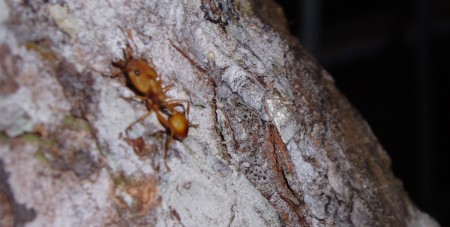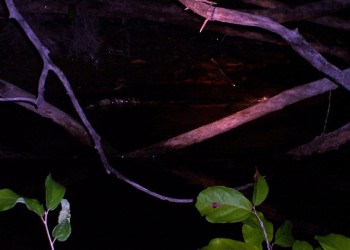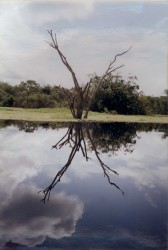After COP 15, energy levels were pretty low. My best quote was that is was like an elephant giving birth to an ant! When I shared this with Dr Trotz, the Scientific Adviser at the Caribbean Community Climate Change Centre (CCCCC), back in January, when we were discussing the region's reaction to Copenhagen, he really laughed. There were other basic logistical stresses too he said like when the team were stuck outside in the freezing cold trying for hours to get into the conference centre - even though they had access cards. It was quite crazy and they missed a key meeting.

In starting this blog, I started to think about this ‘ant’ and then about all the ants out there and how each ant makes a contribution and presses on despite the peril towards a goal and an amazing construction. Despite no legal or political agreement - the Copenhagen Accord has opened the door for some change. So in 2010 – what had my climate change orientated ant journey faced so far? The headlines would definitely be: The Copenhagen Accord aftermath and discussions about fast start finance, ‘climate gate’ and attacks on climate science, the Haiti earthquake and building it back better, and finally the PPCR (Pilot Programme for Climate Resilience) scoping and introduction visits in the Caribbean.
I will however just talk this time about one thread and that is the discussions on fast start finance.
I met with my DFID colleagues, Laure Beaufils and Shailaja Annamraju, who were tasked with drafting a submission about the DFID position on fast start finance for wider discussion within the UK government. They were enquiring about the expectations of the Caribbean governments, where national processes were and about the declaration at the Commonwealth heads meeting in Trinidad last year. The declaration proposed that a dedicated stream of at least 10% of the fast start fund from Commonwealth countries go to Small Islands and associated low lying coastal states of the Alliance of Small Island States (AOSIS), given their high vulnerability.


It was really useful to hear about the priorities, binding parameters and thoughts about what DFID’s preferred approach should be. It was also great to find out that Shailaja and I had actually met and worked together in Guyana when I was a VSO there a few years ago - so we had a little reminisce about the good friends we made and the famous Friday night parties at Palm court or the river trips where the black water was like a mirror in the day or when you could see the red eyes of the cayman lurking offshore at night!
Over the next few weeks I observed a kind of mini replication of what the global negotiations must be like, as all the DFID advisers etc were giving their inputs about approach and pros and cons of different funding channels to be used. The email traffic exchange was like ants on super drive. When I spoke to Laure briefly a week later about some editing changes she sounded shattered – it was certainly intense and this was just the first stage of the internal UK debate.
We really have to do everything we can to ensure fast start finance delivers concrete impacts on the ground, maximises development co-benefits and supports transition or testing of new approaches. Since a green fund will take some time to be established the working hypothesis that seems to be on the table, which I agree with, is that a mix of both bilateral/regional and multilateral funding would work best initially.

After the end of the January deadline date when countries were asked to submit their emission reduction targets for 2020 or appropriate mitigation actions – talking with Caribbean Community (CARICOM)– they were pretty vocal that there is a lot more work to be done -especially given the fact that current commitments to the Accord so far do not limit global temperature increases to 2’C – more like 3.4’C – which for the small island states is untenable. We know that some impacts at this level will be catastrophic and will mean relocation for many small island people in the future.
However, I like the way Dr Ken Leslie – the Executive Director of the Caribbean Community Climate Change Centre (CCCCC) - explains it. He describes climate change as a slow-onset disaster, and makes an analogy with a famous experiment involving a frog and hot water. If the frog is dropped into already boiling water, it’ll jump out immediately. But if the frog is placed in water that is warmed very slowly, it doesn’t jump out and eventually is boiled alive. Let us hope we can be smarter about the risk we face and take action before our best options are not available to us anymore.
Next time I will talk about the PPCR process here in the Caribbean which is about bringing climate change into the broader government planning process and scaling up the adaptation efforts that are needed.

2 comments
Comment by Carl posted on
Extending the analogy, we're pretty smart frogs but still find it hard to change. It’s as if there was an amphibian version of the IPCC running the models and sifting the scientific evidence of changes in the frogs' simmering pot but still no one hops out. Perhaps then our delayed action is not just because of the burden that massive change to a climate resilient future entails. It could also be that getting to the change involves a process so unfamiliar that no one knows up front what position or role they will occupy once the change has come about. Could more positive vision around the kind of futures that we can enjoy in a climate resilient world help make us see beyond our individual uncertainties?
Comment by Bruce Potter posted on
In your apparent last post on March 10, you said:
Next time I will talk about the PPCR process here in the Caribbean which is about bringing climate change into the broader government planning process and scaling up the adaptation efforts that are needed.
I can hardly wait . . . I used to try to follow Climate Change issues in the Caribbean on the CCCCCCCCC web site, and was the single most prolific poster there, but now they seem to have erased the site and started over (more blue in the graphics, otherwise indistinguishable from previous version, EXCEPT that they have erased all of the previous data on pages and in the Forum.
Where do you suggest getting current, on-going info about CC issues in the Caribbean?
Bruce Potter of Island Resources Foundation, moderator of 30+ e-mail groups on environment and sustainable development issues for small islands